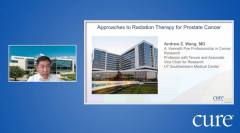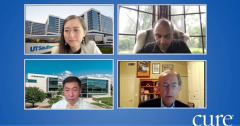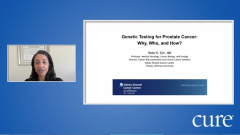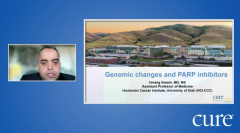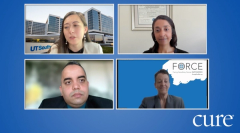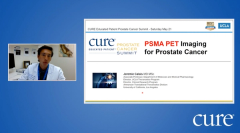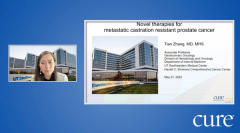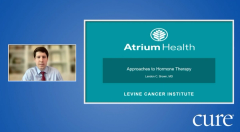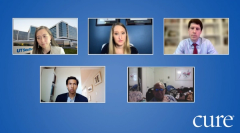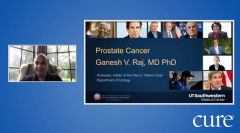
Educated Patient® Prostate Cancer Summit Genetics & Genomics Panel: May 21, 2022
Watch Dr. Veda N. Giri, Dr. Umang Swami and Sue Friedman answer questions about genetics and genomics during the CURE Educated Patient Prostate Cancer Summit.
Episodes in this series

This panel was moderated by Dr. Tian Zhang and featured Dr. Veda N. Giri, Dr. Umang Swami and Sue Friedman.
Zhang: Sue, to start, I would like to ask you to introduce yourself to us. And can you discuss your experiences with hereditary cancers?
Friedman: Yes, thank you so much for having me, it's always an honor. And this is a topic I'm really passionate about, I was diagnosed with breast cancer, kind of out of the blue at age 33. And only, you know, kind of through my own my own research on it, learn that, you know, I had a lot of the red flags for inherited mutation. But I didn't have a big family history, and I didn't have a big family. And so it does turn out that I have a BRCA2 mutation that caused my cancer, and probably inherited from my father.
And so, you know, certainly, as Dr. Giri was talking about, telling family members, I told all my family members, including my father, who really tried to avoid the medical community as much as possible and was like the opposite of me. And so later, probably about five years later, he had an elevated PSA test that was found incidentally. And, you know, then the data was just emerging about the link between BRCA2 and really more aggressive prostate cancers. And I did everything I could to encourage my dad to have his follow up on his PSA test, which he never did. And then also, you know, to encourage my dad and my other family members to get genetic counseling and testing and, you know, sadly to no avail. And it just really talks to how hard sometimes cascade testing can be in that communication with your relatives and especially, in my case with my dad and and sadly, he did develop metastatic castrate castration resistant prostate cancer that did end his life. And, you know, it was before PARP inhibitors. So this was like 2005, 2006. And so it's been really gratifying for me to see all this research and awareness and everything and really appreciate the session and the presentations from both speakers.
Zhang: Thanks so much for sharing your experiences and hard to hear but in a very insightful in terms of how families can get tested, and hopefully diagnosed early and follow quickly. It really speaks to what Dr. Giri was discussing in her presentation.
We have a few questions in the chat and on the message box, so keep them coming. But our first question is about the differences of next generation sequencing and comprehensive genomic profiling. Maybe Dr. Giri, you can kick us off here. What are the differences? And how do people kind of think about comprehensive genomics versus next generation sequencing versus some germline testing?
Giri: Yeah, no, it's a really good question. Thank you. And, you know, I'm just trying to think of the best way to phrase it. So basically, you know, next generation sequencing is a technology. And so it's a way of looking at multiple regions of our genomes or our DNA. And now even beyond just DNA, you know, looking at various different molecular aspects and profiles.
But basically, if we just look at talking about DNA, it's a way of doing sequencing in a very rapid fashion called high throughput. So basically, not having to look gene by gene by gene, but really doing this kind of like full on 1000s of regions for testing for sequencing and looking at alterations. The comprehensive genomic profiling is a strategy that leverages next generation sequencing so it can be applied in the tumor side. So there can be genomic profiles, comprehensive genomic profiles, that are looked at in the tumors, or even now we can look at them in circulating tumor DNA, you know, with different tissues of interest to look at, you know, what can be and it depends on the question, you know, what are we looking at from a standpoint of does this inform therapy? What does this tell us about mutation burden to help inform, you know, different aspects of therapy or decision making, etc. That can be done on the tumors on the inherited germline side, Comprehensive panel testing is another approach that does use next generation sequencing. But it's basically a larger set of genes that can be tested to look at was there an inherited genetic mutation, you know, in this patient and explaining the patient's history and their families’. So it's basically marrying the technology with the strategies that are being used in terms of whether it's molecular profiling on the tumor side, or genetic testing on the germline side. So I hope that answers the question.
Zhang: Oh, no, that was really great. Very thorough answer. Thank you so much, Dr. Giri. Another question has come through more on the therapeutic side, Dr. Swami, maybe you can take this one. Do all patients have to do hormone therapy in order to start on PARP inhibitor therapy?
Swami: So the current approvals for (Lynparza [Olaparib]) and (Rubraca rucaparib]) are after progression on novel hormonal therapies like (Zytiga [abiraterone]) or (Xtandi [enzalutamide]). Having said that, there are clinical studies like Amplitude and TelePro3, which are enrolling patients in the first-line setting however, they are also in combination with abiraterone or enzalutamide, respectively. So briefly, the approval unless it's prescribed off label, these drugs are prescribed after progression on novel hormonal therapies like abiraterone or enzalutamide.
Zhang: That's how I use it in our practice as well. And thank you so much for that. And maybe back to Dr. Giri, what is the rate of false-negatives for BRCA2 genetic testing? And do you know, I think some may be more anxious about it and asking about, you know, are there false-negatives?
Giri: That's a really good question. So this really points to the importance of going with a very well experienced qualified genetics laboratory. Because you know, when we're talking about genetic testing, we're talking about this being done in the clinical context. So ordered by a health care provider, and done at a clinical genetic testing laboratory. It's comprehensive testing. They're looking for 1000s and 1000s of mutations in these genes, for example, with BRCA1 or BRCA2. And they use multiple different ways of making sure that they can't miss a mutation to the best that the technology can be done today. It's very, very low to have a false-negative. When it's done at a qualified clinical genetics laboratory. One thing to keep in mind is the direct-to-consumer tests. Some of these are well known, for example, they may only be testing three mutations in BRCA 1 and 2. For example, the Ashkenazi Jewish founder mutations, in that case, it could be deemed as a false-negative if you think about it, because these two genes have 1000s of mutations in them that were not tested by those tests, you know, and so, a patient can think that they don't have a mutation when they actually do but it wasn't tested for in the direct-to-consumer test. So just really important to keep in mind go through your doctor and health care provider or genetics professional when thinking about genetic testing for cancer risk.
Zhang: Nursing those characteristics, right are so important. Sue did you want to chime in on that?
Friedman: Yeah, I just wanted to add one other thing, too. And that is people who had testing before 2013 to the technology has gotten so much better that one of the things that we highly recommend to people is, if you had genetic testing, and it was negative, and they could not find a mutation responsible in your family, then speak to a genetic counselor and see if there's also additional testing now that may be appropriate for you.
Zhang: That's great insight. And actually, Sue we’ll stay with you for a moment. Can you discuss the resources available at FORCE for our prostate cancer patients and their families?
Friedman: Yeah, for us, it's really focused on the hereditary experience and the hereditary aspects. So we have information for people with prostate cancer, about the genetic counseling, how to find a genetic counselor genetic testing, and the different genes that are associated with hereditary prostate and other cancers, as well as keeping updated with the national guidelines which are updated on an annual basis.
And then we provide peer support from other people with inherited mutations who have been through the experience and we match people by mutation by situation so prostate cancer survivor to prostate cancer survivor and a lot of peer support there. We also match people to clinical research and clinical trials and I was really happy to see a lot of the studies that Dr. Swami was talking about.
On the FORCE website, we particularly focus on studies that are open to people with inherited or even acquired mutation. So many of those studies are there, we try and write them up in plain language, so that people can understand at a glance, you know, is this relevant for me. And then of course, they would end up going and speaking to a health care professional about whether or not they would like to participate.
And then the other thing we do is education, peer support, research, and then public policy, where we're really trying to influence some of the laws and access to care access to things like genetic testing, and PSA testing for people who are high risk, as well as you know, making sure that we're lowering barriers to access to care and services.
Zhang: Right. So can you share with us that that website that you're referring to?
Friedman: Yes, thank you. It's facingourrisk.org.
Zhang: Very good. With our last two minutes here, I want all of our panelists just to share with us any takeaways, maybe Dr. Swami start with you.
Swami: So I would like to emphasize the role of genomic test, testing both in the tumor as well as germline in patients with metastatic prostate cancer, because that can lead to multiple other treatment options, treat clinical trials, as well as counseling prognostication, and may help the other family members.
Zhang: Right. So important. Dr. Giri, your takeaways?
Giri: I think I would emphasize the importance of knowing your family history. And thinking about this, you know, from the aspect of the male relatives, female relatives, blood relatives, and thinking of cancers across the board, since these cancers can be very much connected and families from a hereditary aspect. And then, you know, just really seeking out genetic counseling or genetics professionals or going through your own physician to think about genetic testing or just genetic evaluation in general. Also, genetics professionals do cancer risk evaluation. So even if there is, you know, genetic testing may be done or may not be done or may not come up with mutations, there are still multiple strategies that are done based on family history and a person's individual cancer risk for heightened screening or earlier screening that could be so relevant. So, you know, definitely seek it out in terms of through your doctor or through a genetics professional. I also would like to just give one other thing is just the NSGC website. That's the National Society of Genetic Counselors, has a great website, if you just go to that, and I can send you the information. It's nsgc.org. They have a website where if you put in your zip code, they can give you genetic counseling programs in your area. So that's another way to reach a genetic counseling program.
Zhang: Wonderful. Thanks for those resources. Very, very helpful. Sue, last thoughts.
Friedman: I think everything that's been said today is really bright on as someone from a hereditary cancer family, I made sure I told everybody that was a blood relevant a relative that might be at risk about it. I would say to it's important to understand the information you're being given what tests have been ordered for you what tests have not. And it's, you know, it's challenging and complicated. Even the terms genetic and genomic are very similar and can be confusing.
So I would encourage everybody to, you know, get a copy of your medical records. Anything you don't understand. Ask your health care professional to explain, get a sense of what tests have been ordered for you. Have you had genetic testing? Have you had tumor testing? What did the results mean? And if you did have, you know, if you haven't had genetic testing, and there's cancer in your family, including yours or you have metastatic cancer, talk to your healthcare professional about referral to a genetics expert.
Transcription edited for clarity.
For more news on cancer updates, research and education, don’t forget to

